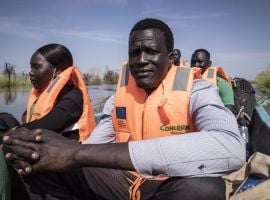
Knowledge Hub
CAR: Underdeveloped; underfunded and under-reported

We delve into the past, present and future of the Central African Republic (CAR), taking a look at why it is one of the world’s poorest countries and what exactly can be done to support its vulnerable communities.
When conflict becomes a barrier to development
CAR is located in the very centre of the African continent, in a fragile and conflict-prone region. It has a beautiful and varied landscape and a diverse - though relatively small - population of just under 5 million. However, CAR has suffered from decades of misrule, coups and periods of violent conflict. The most recent conflict began at the end of 2012 and at its height was extremely violent, causing widespread destruction and forcing millions to flee their homes.
As a result, CAR has seen little development. On the latest Human Development Index it is ranked 188th out of 189 countries, making it the second least developed country in the world. CAR was also ranked as the world's hungriest country in the 2019 Global Hunger Index.
Shocking statistics
This makes life in CAR hard. Very hard.

Life expectancy at birth is 51 and a half years; and it has the highest number of maternal deaths in the world. The country is rich in diamonds, gold, oil and uranium but has one of the world's poorest populations: close to three quarters of the population live below the international poverty line – on less than US$1.25 a day.
At the height of the conflict in CAR, fields in many areas were trampled or burned, and food reserves, seed stores and livestock were looted. Equipment for farming and fishing was lost or destroyed. Moreover, health centres and schools often became temporary shelters for armed groups, many of which were damaged to the point of becoming unusable. Safe drinking water, already difficult to come by, became even scarcer. In one area, there were only three hand-pumps for over 45,000 people before Concern arrived. And, as often happens, it is communities - in particular women, children, the elderly and people with disabilities - that suffer the most during times of conflict and upheaval.
Making matters worse…
Now, the prolonged conflict has led to a reduction in income and access to food, and communities struggle to meet their basic needs in terms of livelihoods, health and education. The destruction of infrastructure has left huge portions of the rural population without access to clean drinking water; has restricted their ability to farm land and grow their own crops for proper nutrition; and has impeded their ability to attend local health facilities.
Since the political crisis, approximately 538,432 people have fled to neighbouring countries such as Cameroon and the Democratic Republic of the Congo (DRC) (UNHCR). Our staff in the field have told us people feel their futures are so uncertain they rarely plant crops that take longer than three months to grow.
And, to make matters worse, the government and international donors have reduced health funding in recent years. This is why many people reply on international aid agencies like Concern.
So, what can be done?
Concern has been operational in the Central African Republic (CAR) since March 2014. The overall goals of our work are to provide humanitarian assistance, build the resilience of communities, and alleviate the suffering of conflict-affected communities. We are delivering programmes addressing issues around food security and livelihoods, health and nutrition, water, sanitation and hygiene, peacebuilding, gender, and disaster risk reduction.
Find out more about our work in CAR






